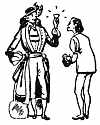 One day, a wealthy nobleman
of the neighborhood showed Palissey a
white enamel cup which came from the Orient. It fascinated him
immediately. In fact, he admired the cup so much that, then and there,
he resolved to make enamelware just like that cup, in spite of the fact
that he knew nothing about pottery, and to the best of his knowledge,
there was no man in France who could make enamels. One day, a wealthy nobleman
of the neighborhood showed Palissey a
white enamel cup which came from the Orient. It fascinated him
immediately. In fact, he admired the cup so much that, then and there,
he resolved to make enamelware just like that cup, in spite of the fact
that he knew nothing about pottery, and to the best of his knowledge,
there was no man in France who could make enamels.He told his wife that evening, "I will have to grope in the dark, for I have no knowledge of clays and I don't know anything about the composition of enamels. "As we say today: he had to start from scratch, because there was no other way. There was nothing in literature, as all important information at that time was kept secret. Palissey said: "I will build a furnace in the old open shed back of the house and will work on this in the evenings. I can coat some of the broken pieces of flower pots with the chemical compounds which I will want to try. Some of these may turn out to be the white enamel I am looking for." For months, in all kinds of weather, he worked in the open shed without apparent results. However, he was getting first-hand experience. |








